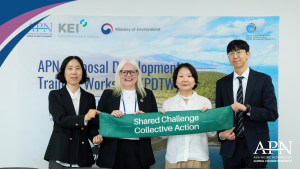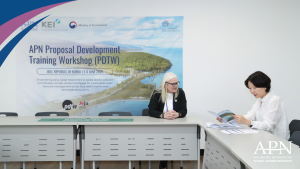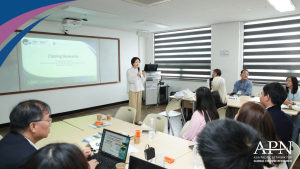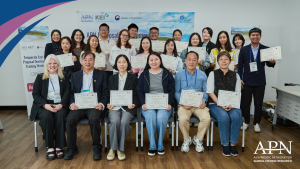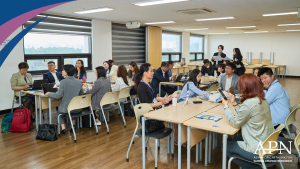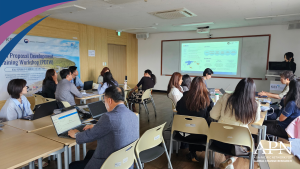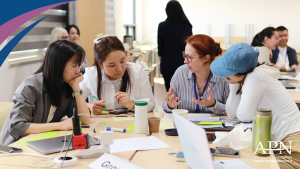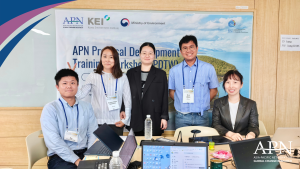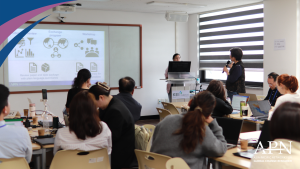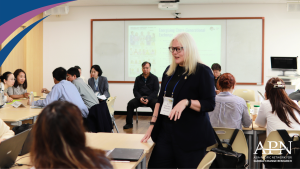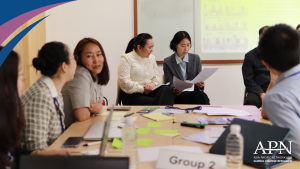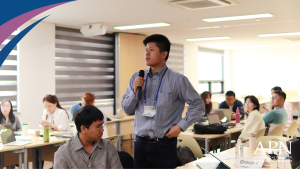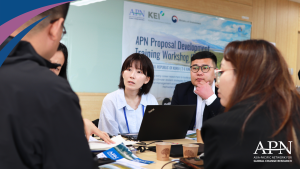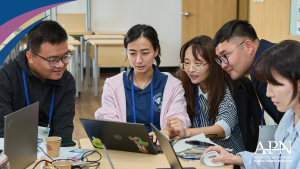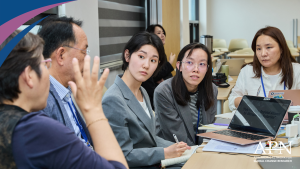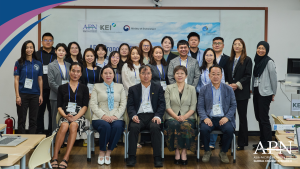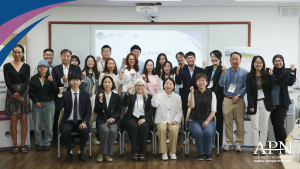
2-6 June, Jeju, Republic of Korea – Against the vibrant backdrop of World Environment Day 2025, Jeju welcomed and hosted the APN Temperate East Asia Proposal Development Training Workshop (PDTW) at the Halla Convention Centre, Cheju Halla University. In partnership with the Ministry of Environment of the Republic of Korea and the Korean Environment Institute, this flagship APN event brought together early career professionals from across the Temperate East Asia region for an intensive week of scientific capacity building and collaboration. The workshop, endorsed by the UN Decade on Ocean Science and registered with World Environment Day, aligned closely with Jeju’s ambitious ‘2040 Plastic Zero Island’ vision and global efforts to end plastic pollution.
Fifteen early career researchers from the Temperate East Asia region (China, Japan, Mongolia, the Republic of Korea and the Russian Federation) participated in the workshop, collaborating in diverse teams of regional and gender balance under the guidance of six regional mentors. The mentoring team comprised APN National Focal Points, Scientific Planning Group members, and former APN project leaders from the following institutions, offering a wealth of regional environmental expertise:
- Chinese Academy of Sciences, China
- Sun Yat-sen University, China
- Jeju National University, Republic of Korea
- Korea Environment Institute, Republic of Korea
- National Fisheries Research and Development Institute, Republic of Korea
- Ministry of Foreign Affairs, Mongolia
Over the course of the workshop, trainees engaged in hands-on experiences and interactive sessions to engage with critical sub-themes, including plastic and microplastic pollution, climate adaptation, and the integration of indigenous, traditional and local knowledge (ITLK) in sustainable resource management. Trainees identified research gaps in regional change in Temperate East Asia, developed compelling research questions, designed budgets and methodologies, and created effective narratives for their proposals. Mock proposal submissions using the APN Information System (APNIS) provided a simulation of a realistic grant application experience, using the APN Call for Proposals as a tangible example.
The workshop culminated in the development of three early career professional-led proposals, each demonstrating a strong commitment to bridging science, policy and community engagement. The summary proposals included:
- Bridging science for cleaner futures: East Asia–South Asia microplastic research workshop
- Small pieces, big change: Weaving science and community for a plastic-free tomorrow
- Microplastic distribution in freshwater ecosystems across varying waste management practices of urban East Asia for locally tailored and regionally integrated policies
Interactive Session: Mentor Wisdom Swap Mini Game
The Mentor Wisdom Swap Mini Game, held on June 4, 2025, during the third day of the TEA-PDTW 2025 in Jeju, was an interactive session designed to foster collaboration and innovative thinking among trainees and mentors. The session involved mentor pairs posing thematic questions related to plastic pollution and climate challenges, with trainee groups brainstorming and pitching responses. The session was structured to encourage creativity, relevance and regional cooperation, aligning with the Asia-Pacific Network for Global Change Research (APN) objectives.
Mentors were divided into three pairs, each offering unique perspectives from their disciplinary backgrounds. Each pair posed a thought-provoking question related to climate adaptation, plastic pollution, or governance mechanisms, sparking in-depth discussion among trainee groups.
One trainee group was awarded the “Wisdom Token” for their compelling pitch, which proposed a circular economy approach to plastic waste with linkages to government priorities, academic collaboration, and community action. Their solution was praised for its practicality, scalability and applicability to local contexts such as fishing villages and island communities. The session empowered early career researchers to refine key skills, including succinct communication, interdisciplinary thinking and collaborative problem-solving under direct mentor guidance.
The session highlighted the critical importance of multi-stakeholder collaboration to address complex environmental challenges, in partnership with governments, academia and communities. Creative governance strategies were also underscored as essential tools for overcoming transboundary and political obstacles, particularly in managing plastic pollution across shared ecosystems. Furthermore, the integration of ITLK was recognised as a valuable component in developing culturally grounded and regionally appropriate solutions. Lastly, the format of the session reinforced the power of clear and concise communication, demonstrating how impactful messaging can elevate research ideas and make them more accessible to diverse audiences.
Linkages with the Asia-Pacific Network of Early Career Professionals for Global Change Research (APN-ECAP)
As a component of the Temperate East Asia PDTW, the APN Secretariat introduced participants to the Asia-Pacific Network of Early Career Professionals for Global Change Research (APN-ECAP) initiative, designed to foster collaboration among the next generation of global change researchers across the region. Ms Naomi Young (APN Secretariat) provided an overview of APN-ECAP’s initiative ambitions and encouraged trainees to join its growing community through LinkedIn and other early career engagement opportunities.
To better understand the priorities of early career professionals in Temperate East Asia, a Mentimeter survey was conducted in the closing session of the PDTW. Participants expressed strong interest in funding and scholarship opportunities, science-policy dialogue and professional development resources. Many also highlighted their existing connections with networks such as the UNDOS Early Career Oceans Professionals, Future Earth Asia, the Australia Awards, and the Oceanographic Society of Japan, underscoring the value of cross-network collaboration in advancing their careers and research impact.
Way forward
The Temperate East Asia PDTW in Jeju, Republic of Korea, demonstrated a significant milestone towards building regional collaboration and network-building in the region through APN. It offered a supportive and engaging environment for early career professionals to develop proposals, establish professional relationships, and acquire the necessary tools and knowledge for effectively addressing regional sustainability challenges. With the 2025 Call for Proposals launching in November, all trainees have been encouraged to submit collaborative research proposals with their regionally diverse teams in the coming months.
The APN Secretariat extends its most sincere appreciation to the Ministry of the Environment of the Republic of Korea and the Korea Environment Institute for their generous support and hospitality in hosting the PDTW event in Jeju, which provided an inspiring and collaborative setting to advance APN’s goals for global change, sustainable development and regional cooperation. The APN Secretariat also shares gracious appreciation to the PICES Secretariat for providing financial support for two early career professional participants from Temperate East Asia, strengthening the next generation of scientific leaders in the North Pacific.
Quotes from keynote speakers
The theme of this program, “Innovative Knowledge and Climate Resilient Solutions for Sustainable Risk Management and Plastic Pollution Mitigation”, is timely and forward-looking. It reflects the impact of building new partnerships and empowering the next generation of leaders. KEI is proud to support this workshop and to collaborate with APN in advancing scientific knowledge cooperation and capacity building. I am particularly pleased to see so many early career professionals from the region gather here to grow, connect and challenge ideas together.
- PDTW Opening remarks from Dr Hongkyun Kim, President, Korea Environment Institute
[The Temperate East Asia PDTW and World Environment Day events] have been a good opportunity to reach out, in the meetings with environmental climate change and biodiversity leaders, and plastic pollution leaders, both in the public and private sector. After finishing this workshop, all trainees have worked together for five days, so this is a small alumni group. Reach out and contact one another to [find out] what you are doing in the future, as it will be helpful for you to find more opportunities.
- PDTW Closing remarks from Ms. Eunhae Jeong, Director General, Ministry of the Environment of the Republic of Korea
Throughout the sessions, it has been inspiring to observe your active participation, intellectual curiosity and dedication to co-developing meaningful proposals. From exploring microplastic pollution and climate adaptation to integrating local knowledge and policy relevance, your work has shown both scientific promise and deep regional awareness. The mentor group feedback also highlighted commendable strengths: your motivation, your initiative in pre-meeting coordination, and your efforts to include underrepresented regions, which contribute greatly to scientific diversity and equity.
- PDTW Closing remarks from Dr Linda Anne Stevenson, Acting Director, APN Secretariat
Testimonials
The workshop not only strengthened my technical skills in proposal writing and project management but also provided a meaningful platform for regional networking. I greatly appreciated the diverse perspectives shared by participants from across Temperate East Asia, which highlighted both the common challenges and unique strengths of our region. The balance between lectures, hands-on exercises and open discussions made the learning process dynamic and enjoyable. Furthermore, the inclusion of science-policy dialogues and World Environment Day activities broadened my understanding of how research can connect with policy and public engagement. I am grateful to APN for organising this valuable workshop and look forward to applying what I have learned in future regional collaborations.
- PDTW Trainee, Pukyong National University, Republic of Korea
The most valuable experience for me was working closely with fellow participants on our group project and taking part in the World Environment Day 2025 event in Jeju. Collaborating with researchers from different backgrounds allowed me to gain fresh perspectives, and joining a global dialogue on pressing environmental issues was truly inspiring.
- PDTW Trainee, IGES Kansai Research Centre,
